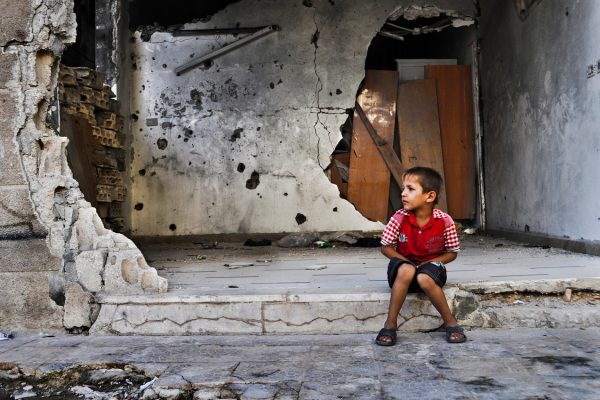UNICEF reported that 1.2 million children are facing acute malnutrition and Afghanistan has one of the world’s highest rates of stunting in children under five: 41 percent.
UNICEF reported that 1.2 million children are facing acute malnutrition and Afghanistan has one of the world’s highest rates of stunting in children under five: 41 percent.
Last December, I travelled to Afghanistan to see for myself the devastating crisis that was pushing the country to the brink of famine. What I saw was heart-breaking, parents giving away their children just so their remaining daughters and sons could eat, five-year-olds begging or selling whatever they could to make money to buy food, and families selling household goods to try and help feed themselves. It was a harrowing experience that will stay with me forever.
I met a lady named Bibi Naz who was struggling to afford food and had to send two of her four daughters away to live with her mother as she could no longer look after them. She hadn’t seen her husband for four years, who was presumed dead. She had previously enrolled in a tailoring course to try and earn an income, but it was closed following the political changes. The more families I visited, the more I kept hearing similar stories.
When the US and UK withdrew their troops last August, 75 percent of the country’s GDP came from international aid, and that supply of money was turned off overnight. Combined with global financial sanctions, an economic crisis ravaged the country.
Banks were severely limiting how much money people could withdraw. The sums that they were allowed to withdraw were simply not enough to provide families with their basic needs.
Medical services declined, children suffered from acute malnutrition, and families starved. The unimaginable pain of giving away a child so that they could be looked after and fed was a story I heard repeatedly.
UNICEF reported that 1.2 million children are facing acute malnutrition and Afghanistan has one of the world’s highest rates of stunting in children under five: 41 percent. And The World Health Organization (WHO) recently reported that tens of thousands of children must undergo emergency medical treatment for acute malnutrition and many in remote areas, unable to get help, have already starved to death.
Little has changed since last August, the statistics are shocking, 24.4 million people (almost 60% of the population) now need humanitarian aid – an increase of 30% in the past year. A shocking 97% of people are expected to be in poverty by the end of the year and 19.7 million people are regularly going hungry – the highest number in the world.
We are now asking, how much more hardship can the Afghan people endure? The time has come for the international community to do the right thing and ease the financial restrictions that are devastating Afghan lives.
The restrictions are crippling the lives of ordinary Afghans, and everything must be done to ensure that people have enough food to eat, and have access to healthcare and the basic essential services.
The international community has a duty to not turn its back on the people of Afghanistan. In recent years, the investment of international aid had brought significant gains to the country including an increase in school enrolment and improved life expectancy.
Now, as humanitarian needs spiral out of control, donors must urgently provide funding to meet the $4.4 billion target under the UN 2022 Humanitarian Response Plan.
But aid alone cannot replace a functioning economy and banking system. The Afghanistan central bank (DAB) needs to be supported so that it can increase the circulation of banknotes and ensure there is enough liquidity to pay the salaries of essential workers and civil servants. Afghanistan’s £9 billion in frozen foreign reserves and assets should be used to get the economy functioning again. Foreign banks must be provided with legal clarity.
It is crucial that the international community works together to find a multilateral, sustainable solution to stem the economic collapse and create an urgent injection of liquidity into Afghanistan.
Recently, I learned of a glimpse of hope, that Islamic Relief were able to provide Bibi Naz, the lady I met last year, with money. Her daughters are now living with her again and she is able to feed them. Three of her daughters are now going to school (the other is too young). She used some of the money to enroll them in after-school classes in mathematics and English, so they can catch up on what they missed.
This transformational story is what could be happening on a larger scale across the country with countless families if the financial restrictions were eased. Afghans are strong and resilient, but generations have seen nothing but hardship.
We cannot allow another year to go past with people struggling to get the basics, such as food, especially when there is a solution to the problem.
To donate to Islamic Relief’s Afghanistan appeal please go to:
https://www.islamic-relief.org.uk/afghanistan-emergency-appeal/





